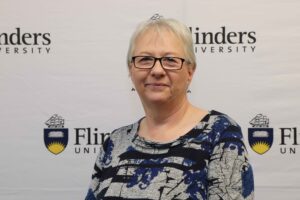
When Deb Rawlings heard the term ‘death doulas’ mentioned during a Dying2Learn Massive Open Online Course conducted by CareSearch at Flinders University during 2016, she realised this was an emerging area within end-of-life care that few knew about in detail.
Death doulas serve as a companion, educator and non-medical supporter for the dying and their family through the process of death, but because they are an unregistered collection of independent operators, Ms Rawlings recognised that their work is largely under-researched – and that this needed to change.
“As we progressed through delivering those Dying2Learn courses in 2016 and 2017, we had more and more women identifying themselves as death doulas, so it was clearly an aspect of end-of-life care that was here to stay,” she says.
As a senior lecturer in Palliative Care at Flinders University and co-investigator of the End-of-Life Essentials Project, Ms Rawlings has made cataloguing the work of death doulas in Australia an important focus of her research – to identify how prevalent they are, and what services they provide.

“Through our research, we can see that death doulas currently provide a service that health professionals do not,” she says. “However, because it’s an emerging profession, there’s no consistency about what death doulas provide, and we need clarity and transparency about what is being offered.”
With a final study currently being completed from five years of work, this large body of research has involved interviewing women who work as death doulas, and currently the families who have used them. Six papers have already been published, with a further two in review, with the depth and breadth of this research unparalleled, leading the world in documenting the role.
“Their roles have evolved and there are increasing numbers of people taking on this role,” says Ms Rawlings. However, death doulas are not registered, there are no recognised professional standards and no set training guidelines. There is also no set business model, so they are all independent contractors or occasionally volunteers. There are also four death doula training organisations in Australia that don’t agree on common points.
“Because of all these factors, we feel it’s important that we provide a baseline of knowledge. The research has not been judgmental. We are coming at this research from a neutral position although it is difficult to draw conclusions on their models of care because there are so many variables at play.
“No two death doulas are alike or operate in the same way. It’s all highly personalised – and with no standardised death doula business model there are inconsistencies in their services, costs, and what clients and families can expect.”
Death doulas also do not appear to think that health professionals understand what it is that they do, indicating that this causes concern that death doulas are a threat. Ms Rawlings takes a different view. “We found they provide a very different non-medical addition to existing services, whereby they are engaged by families. While health professionals have defined roles, formal, accredited training and scope of practice, death doulas don’t, but they do have the potential to complement the health professional role via new models of service provision.
“We really don’t know if they will become part of organised institutions, because they greatly value the flexibility and independent of their role, specifically because this enables them to work outside of limiting organisations.”
Ms Rawlings has been greatly encouraged to see cultural specialists starting to emerge within death doula work, such as working alongside culturally and linguistically diverse groups, and with Aboriginal and Torres Strait Islander people. “For death doulas to become a familiar part of such communities, it will build great trust.”
The Flinders University research is being recognised by groups including Palliative Care Australia, the nation’s peak body representing end-of-life care. It is also encouraging other academics and researchers to have broader conversations about what role death doulas play in the palliative care landscape.
“There is certainly more confidence among people speaking about death doulas because of the Flinders University research,” says Ms Rawlings, “but now we have to make this part of a much bigger conversation in the community about death and dying.”

